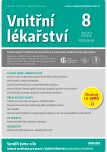Venous thromboembolism in antiphosholipid syndrome
Authors:
Alena Buliková; Miroslav Penka
Authors‘ workplace:
Oddělení klinické hematologie Fakultní nemocnice Brno
; Interní hematologická a onkologická klinika Masarykovy univerzity v Brně
; Alena Buliková, Miroslav Penka
Published in:
Vnitř Lék 2022; 68(8): 493-497
Category:
Main Topic
doi:
https://doi.org/10.36290/vnl.2022.106
Overview
Antiphosholipid syndrome (APS) is defined by the presence of clinical and laboratory criteria, it means by presence of antiphospholipid antibodies. Venous thromboembolism belongs to the most frequent clinical manifestation of this syndrome. Here we summarised basic pathophysiological mechanisms of venous thrombosis and lung embolism development, epidemiology of APS, and also the situations when this syndrome should be considered. The possible difficulties of laboratory diagnosis and their therapy involvement are mentioned.
Keywords:
treatment – antiphospholipid syndrome – diagnose
Sources
1. Miyakis S, Lockshin D, Atsumi T et al. International consensus statement on an update of the classification criteria for definite antiphospholipid syndrome (APS). J Thromb Haemost. 2006;4 : 295-306.
2. Garcia D, Erkan D. Diagnosis and management of the antiphosholipid syndrome. NEJM. 2018;378 : 2010-2021.
3. Rumsey DG, Myones B, Massicotte P. Diagnosis and treatment of antiphosholipid syndrome in childhood: A review. Blood Cells Mol, DiS. 2017;67 : 34-40.
4. Rauch et al. Origin of antiphoshopilid antibodies. In Ercan G, Loschin MD. Antiphosholipid syndrome. Current research highlights and clinical insights. Springer international publishing 2017; pp 29-52. DOI: 1007/978-319-55442-6.
5. Taha M, Samavati L. Antiphosholipid antibodies in COVID-19: a meta‑analysis and systematic review. RMD Open 2021;7:e001580.
6. Risse J, Viera M, Beuret F et al. Reversible drug ‑ induced antiphosholipid syndrome. Lupus. 2018;27 : 333-33.
7. Malý R, Masopust J, Hosák L, Konupčíková K. Assessment of a risk of a venous thromboembolism and its possible prevention in psychiatric patients. Psychiatry Clin Neurosci. 2008;62 : 3-8
8. Duarte‑Garcia A, Pham MM, Crowson CS et al. The epidemiology of antipshopholipid syndrome: A population‑based study. Arthrit Rheumatol. 2019; 71 : 1545-1552
9. Miranda S, Park J, Le Gal G et al. Prevalence of confirmed antiphosholipid syndrome in 18-50 years unselected patients with first unprovoked venous thromboembolism. J Thromb Haemost. 2020;18 : 916-930.
10. Cervera R, Serrano R, Pons‑Estel GI et al. Morbidity and mortality in the antiphosholipid syndrome during a 10-year period: a multicentre prospective study of 1000 patients. Ann Rheumat, DiS. 2015;74 : 1011-1018.
11. Pengo V, Ruffatti A, Lenani C et al. Clinical course of high‑risk patients diagnosed with antiphosholipid syndrome. J Thromb Haemost. 2009;8 : 237-242.
12. Tektonidou MG, Andreoli L, Limper M et a. EULAR recommendations for the management of antiphosholipid syndrome in adults. Ann Rheum, DiS. 2019;78 : 1296-1304.
13. Zuily S, Cohen H, Isenbergr D et al. Use of direct oral anticoagulants in patients with thrombotic antiphosholipid syndrome: Guidance from the Scientific and Standardization Committee of the International Society on Thrombosis and Haemostasis. J Thromb Haemost. 2020;18 : 2126-2137.
14. Pengo V, Denas D, Zopplellaro G et al. Rivaroxaban vs warfarin in high risk patients with antiphospholipid syndrome. Blood 2018. doi: 10.1182/Blood-2018-04-848333.
15. ASTRO‑APS investigators. Apixaban compared with warfarin to prevent thrombosis in thrombotic antiphospholipid syndrome: a randomized trial. Blood Advances 2021. doi: 10.1182/bloodadvances.2021005808/1829277
16. Pastori D, Menichelli D, Cammisotto V, Pignatelli P. Use of direct oral anticoagulants in patients with antiphosholipid syndrome: A systematic review and comparison of the international Guidelines. Front Cardiovasc Med. 2021; doi: 10.3389/fcvm.2021. 715878.
17. Cohen H, Cuadrado MJ, Erkan D et al. 16th International congress on antiphosholipid antibodies task force report on antiphosholipid antibodies treatment trends. Lupus. 2020;29 : 1571-1593.
18. Keeling D, Mackie I, Moore GW et al. Guidelines on the investigation and management of antiphospholipid syndrome. BJH 2012;157 : 47-58.
19. Pengo V, Tripodi A, Reber G et al. Up‑date of the guidelines for lupus anticoagulant detection. J |Thromb Haemost. 2009;7 : 1737-1740.
Labels
Diabetology Endocrinology Internal medicineArticle was published in
Internal Medicine

2022 Issue 8
-
All articles in this issue
- Hlavní téma – Hematologie
- Today's view of hereditary thrombophilia
- Venous thromboembolism in antiphosholipid syndrome
- Selected severe „haematological“ syndromes in adult intensive care patients
- Evolution of deep vein thrombosis treatment from leeches to mechanical thrombectomy
- Traditional and new biomarkers of congestion in heart failure
- Allergen immunotherapy in treating allergic eosinophilic asthma
- Pulmonary storage
- Cognitive impairment and the threat of dementia pandemic or the journey of hypertensive patients to self-care deficit
- Antithrombotic therapy and digestive endoscopy
- Jak dobře jsme léčili hypertenzi v posledních 25 letech?
- Internal Medicine
- Journal archive
- Current issue
- Online only
- About the journal
Most read in this issue
- Selected severe „haematological“ syndromes in adult intensive care patients
- Today's view of hereditary thrombophilia
- Allergen immunotherapy in treating allergic eosinophilic asthma
- Antithrombotic therapy and digestive endoscopy
